Submitted:
17 April 2023
Posted:
18 April 2023
Read the latest preprint version here
Abstract
Keywords:
1. Introduction
2. Setting the scene: the evolution of fisheries co-management endeavors
2.1. The place of Greek fishery and aquaculture sectors in EU-27

2.2. Fisheries co-management and governance as subjects of change and evolution
2.2.1. Fisheries governance considered under the lens of evolutionary and interactive governance.
2.2.2. A bit of FLAGs history in Greece
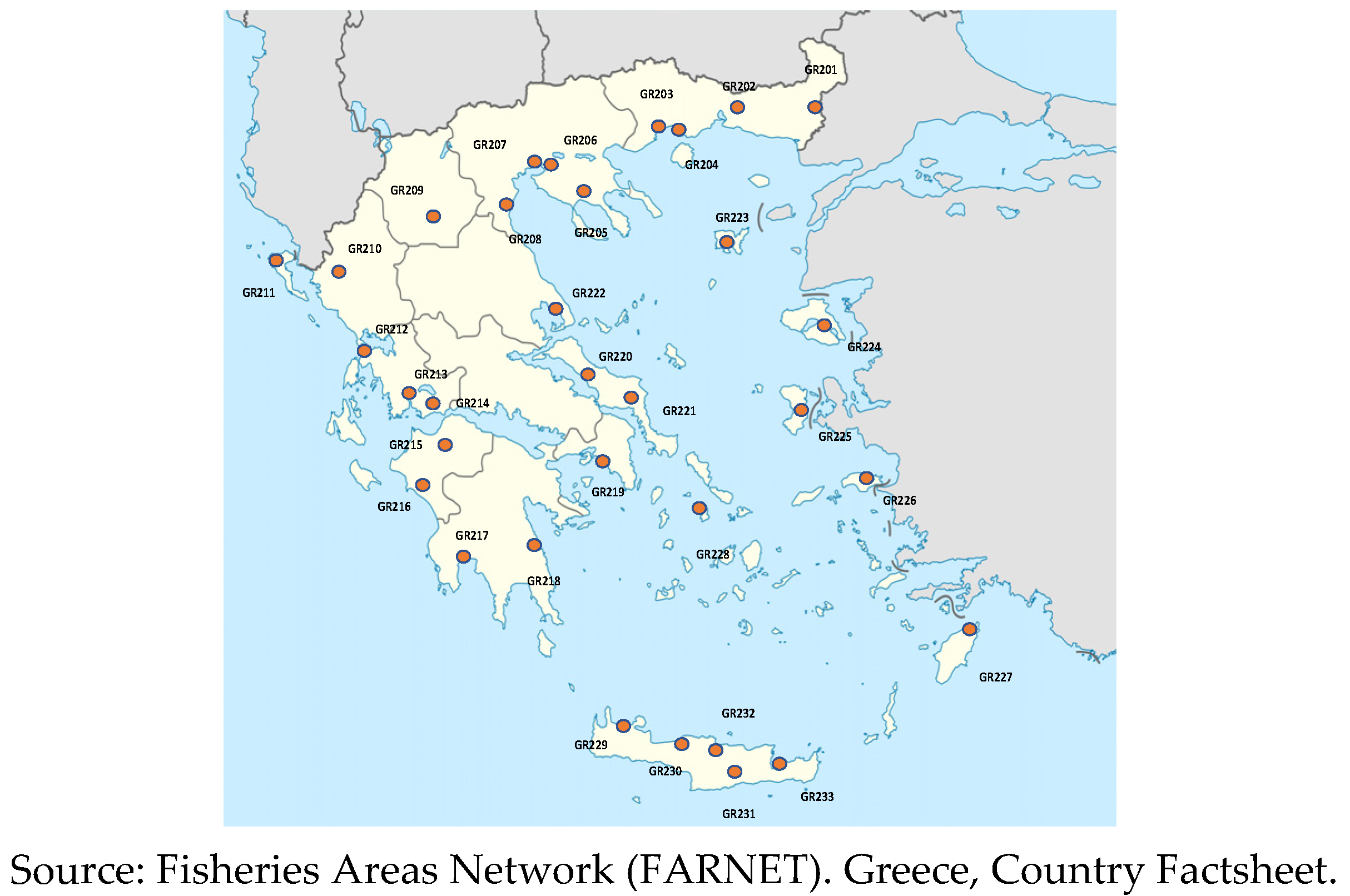
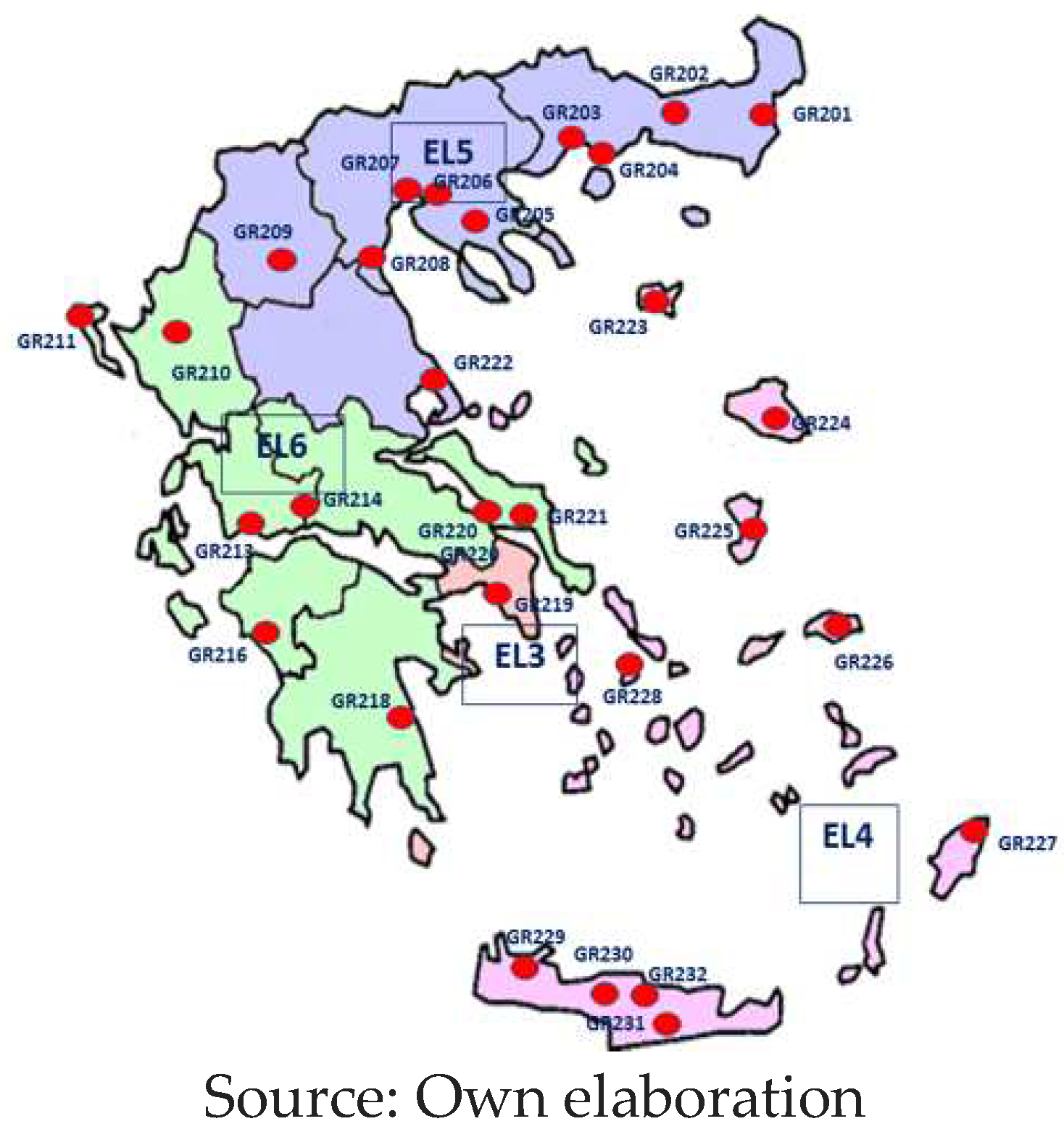
2.3. MSP as a key process for fisheries co-management, also considering climate change effects
3. Materials and Methods
| NUTS1_Greece | Number of participating FLAGs | Fisheries employment | |
|---|---|---|---|
| EL3 | Attica | 1 | 380 |
| EL4 | Aegean Islands and Crete | 10 | 4.117 |
| EL5 | Northern Greece | 9 | 2.435 |
| EL6 | Central Greece | 9 | 3.565 |
| Total | 29 | 10.497 | |
4. Results
Thematic focuses of CLLD strategies 2014-2020
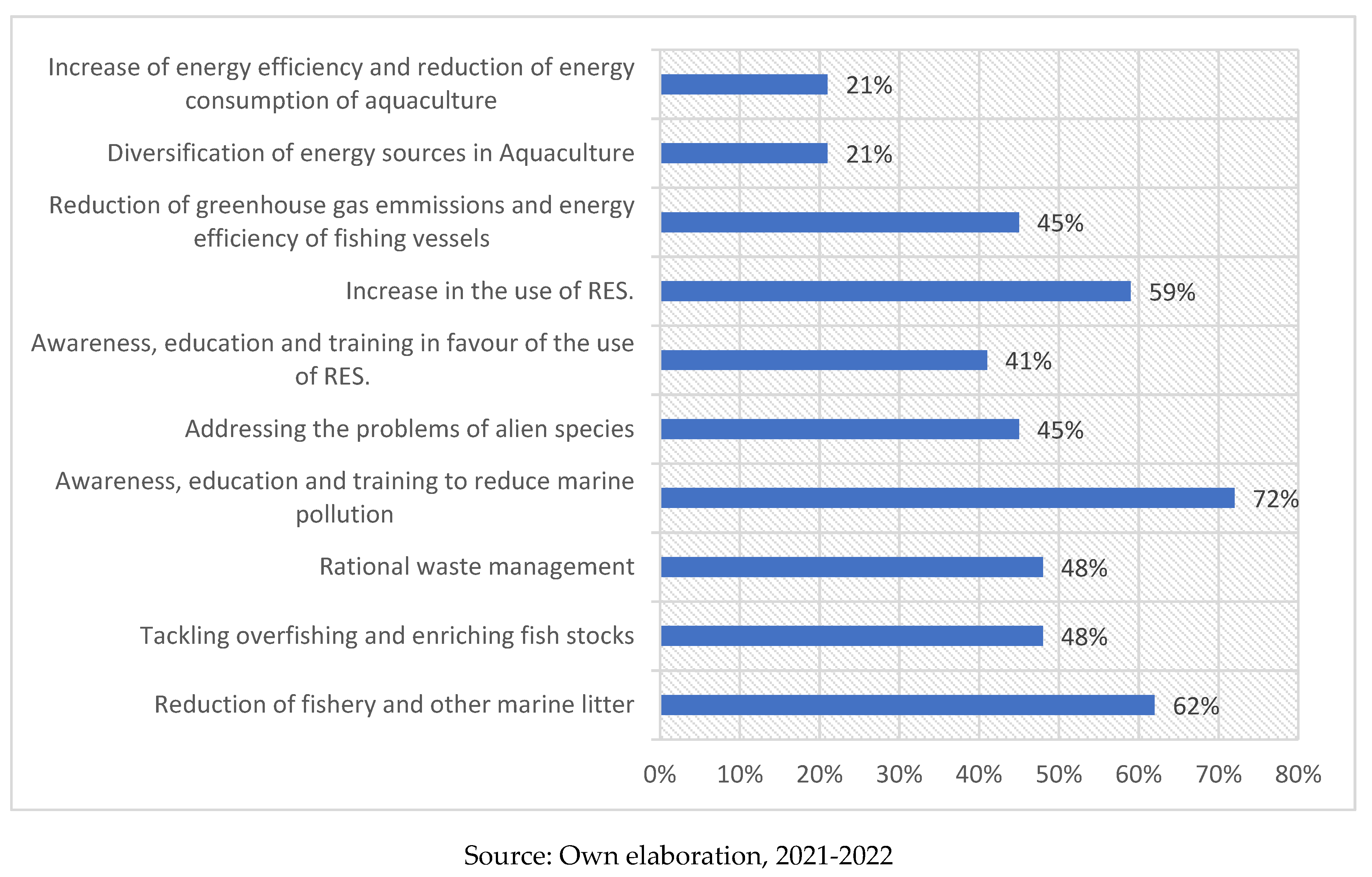
- ■
- in insular areas and in areas including both island and coastal fishery areas, a significant impact to the reduction of gas emissions as well as to the increase of the energy efficiency of the fishing vessels is expected (Table 3).
- ■
- in the coastal and inland fishing dependent areas as well as in the mixed island and coastal space, impact on increasing the use of RES is expected to be particularly important (Table 3).
- ■
- the impact of CLLD Programs to the awareness, education and training in favor of the use of RES is particularly important in the inland fishing dependent areas and in the coastal and insular space as well (Table 3).
- ■
- As already noticed, the “invasion” of alien species in the Greek seas, is addressed to a greater extent, in the exclusively island fishing dependent areas (Table 3).
- ■
- The impact of the CLLD programs to the awareness, education and training of both citizens and local agencies/enterprises to reduce marine litter seems to be vital in all four types of intervention areas (inland-only, island-only, coastal only and areas combining island and coastal areas), see also Table 3.
- ■
- The influence of CLLD programs is vital to the rational waste management of aquaculture and fish processing plants in coastal areas and mixed coastal and insular space (Table 3).
- ■
- Tackling overfishing and enriching fish stocks seems to be more important in inland and in coastal fishery dependent areas (Table 3).
- ■
- Finally, reducing fishery-driven and other marine litter is expected to benefit all types of the fishing dependent areas (insular, coastal, inland, insular & coastal)(Table 3).
| Type of area | Actions where contribution is expected | Percentages appeared in the survey (stating that they agree to strongly agree) |
|---|---|---|
Excl. Insular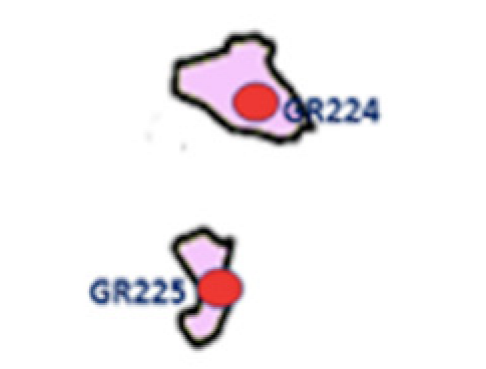
|
|
54.5% 100.0% 72.7% 72.7% 50.0% |
Excl. Coastal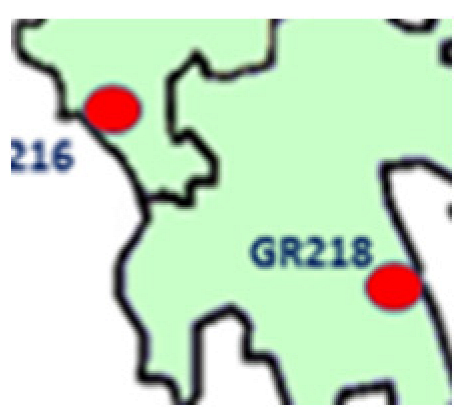
|
|
100.0% 63.6% 63.6% 63.6% 72.7% |
Inland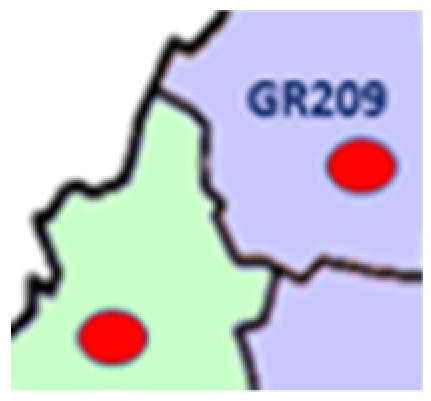
|
|
63.0% 100.0% 100.0% 63.6% 100.0% |
Insular & coastal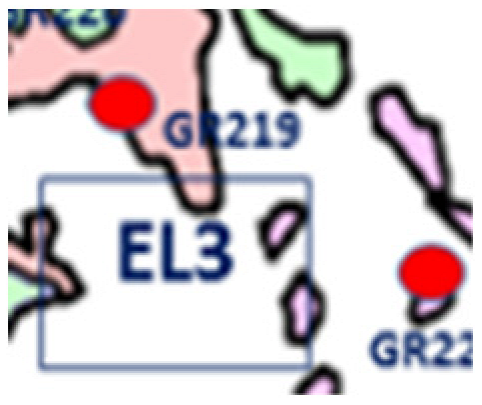
|
|
54.5% 66.0% 66.6% 50.0% 50.0% 66.67% 50.0% |
5. Discussion
FLAGs considered under the lens of evolutionary governance
6. Conclusions and policy recommendations
Author Contributions
Funding
Informed Consent Statement
Acknowledgments
Conflicts of Interest
References
- Barange, M.; Bahri, T.; Beveridge, M.C.M.; Cochrane, K.L.; Funge-Smith, S.; Poulain, F. (Eds.) Impacts of climate change on fisheries and aquaculture: synthesis of current knowledge, adaptation and mitigation options; FAO Fisheries and Aquaculture Technical Paper No. 627; FAO: Rome, Italy, 2018; p. 628. [Google Scholar]
- Maulu, S.; Hasimuna, O.J.; Haambiya, L.H.; Monde, C.; Musuka, C.G.; Makorwa, T.H.; Munganga, B.P.; Phiri, K.J.; Nsekanabo, J.D. Climate Change Effects on Aquaculture Production: Sustainability Implications, Mitigation, and Adaptations. Front. Sustain. Food Syst. 2021, 5, 609097. [Google Scholar] [CrossRef]
- Daw, T.; Adger, W.N.; Brown, K.; Badjeck, M.-C. Climate change and capture fisheries: potential impacts, adaptation and mitigation. In Climate change implications for fisheries and aquaculture: overview of current scientific knowledge; FAO Fisheries and Aquaculture Technical Paper No. 530; Cochrane, K., De Young, C., Soto, D., Bahri, T., Eds.; FAO: Rome, Italy, 2009; pp. 107–150. [Google Scholar]
- OECD. The Economics of adapting fisheries to climate change; OECD Publishing: Paris, France, 2010; Available online: http://dx.doi.org/10.1787/9789264090415-en (accessed on 15 April 2023).
- Peck, M.A.; Catalán, I.A.; Damalas, D.; Elliott, M.; Ferreira, J.G.; Hamon, K.G.; Kamermans, P.; Kay, S.; Kreiß, C.M.; Pinnegar, J.K.; Sailley, S.F.; Taylor, N.G.H. Climate Change and European Fisheries and Aquaculture: ‘CERES’ Project Synthesis Report; Hamburg, Germany, 2020. [Google Scholar] [CrossRef]
- FAO. Assessing climate change vulnerability in fisheries and aquaculture: Available methodologies and their relevance for the sector; FAO Fisheries and Aquaculture Technical Paper No. 597; Brugère, C., De Young, C., Eds.; FAO: Rome, Italy, 2015. [Google Scholar]
- European Commission. Community-led local development and the blue economy, Publications Office of the European Union; Directorate-General for Maritime Affairs and Fisheries, 2023; Available online: https://data.europa.eu/doi/10.2771/392 (accessed on 15 April 2023).
- FAO. The State of Mediterranean and Black Sea Fisheries; General Fisheries Commission for the Mediterranean: Rome, Italy, 2016; Available online: http://www.fao.org/3/a-i5496e.pdf (accessed on 15 January 2022).
- European Commission. Report from the Commission to the European Parliament and the Council, outlining the progress made in implementing Directive 2014/89/EU establishing a framework for maritime spatial planning; Brussels, 3.5.2022; COM (2022) 185 final; Available online: https://eur-lex.europa.eu/legal-content/EN/TXT/?uri=CELEX:52022DC0185.
- European MSP Platform. Available online: www.msp-platform.eu (accessed on 14 March 2023).
- Pertoldi, M.; Fioretti, C.; Guzzo, F.; Testori, G.; De Bruijn, M.; Ferry, M.; Kah, S.; Servillo, L.A.; Windisch, S. Handbook of Territorial and Local Development Strategies; Pertoldi, M., Fioretti, C., Guzzo, F., Testori, G., Eds.; Publications Office of the European Union: Luxembourg, 2022; JRC130788. [Google Scholar] [CrossRef]
- OECD. Fisheries and Aquaculture in Greece. January 2021. Available online: https://www.oecd.org/agriculture/topics/fisheries-and aquaculture/documents/report_cn_fish_grc.pdf, (accessed on 14 March 2023).
- European Union. Facts and Figures on the Common Fisheries Policy, Basic statistical data-2022; Luxemburg, February 2022. [Google Scholar]
- European Commission. Fleet in a Glimpse, Situation as in July 2011. Available online: https://webgate.ec.europa.eu/fleet-europa/stat_glimpse_en (accessed on 22 September 2022).
- Scientific, Technical and Economic Committee for Fisheries (STECF). The 2021 Annual Economic Report on the EU Fishing Fleet (STECF 21-08); EUR 28359 EN; Publications Office of the European Union: Luxembourg, 2021; JRC126139; ISBN 978-92-76-40959-5. [Google Scholar] [CrossRef]
- Liontakis, A.; Vassilopoulou, V. Exploring fishing tourism sustainability in North-Eastern Mediterranean waters, through a stochastic modelling analysis: An opportunity for the few or a viable option for coastal communities? Ocean & Coastal Management 2022, 221, 106118. [Google Scholar] [CrossRef]
- Vassilopoulou, V.; Kikeri, M.; Politikos, D.; Kavadas, S. Action Plan on the testing area of Greece, PORTODIMARE Project, INTERREG ADRION. 2021. Available online: https://portodimare.adrioninterreg.eu/wp-content/uploads/2020/12/DT2.8.3_Action-Plan-on-the-testing-area-of-Greece_new.pdf, (accessed on 14 March 2023).
- Kyvelou, S.S.I.; Ierapetritis, D.G. Fisheries Sustainability through Soft Multi-Use Maritime Spatial Planning and Local Development Co-Management: Potentials and Challenges in Greece. Sustainability 2020, 12, 2026. [Google Scholar] [CrossRef]
- Hellenic Statistical Authority. Marine fishing survey with motorized vessels; Year 2020; Athens, 2021. [Google Scholar]
- Kyvelou, S.S.I.; Ierapetritis, D.G. Fostering Spatial Efficiency in the Marine Space, in a Socially Sustainable Way: Lessons Learnt From a Soft Multi-Use Assessment in the Mediterranean. Front. Mar. Sci. 2021, 8, 613721. [Google Scholar] [CrossRef]
- Macfadyen, G.P.; Cappell, R. Characteristics of Small-Scale Coastal Fisheries in Europe, EPRS: European Parliamentary Research Service. 2011. CID: 20.500.12592/gr3ght. Available online: https://policycommons.net/artifacts/1338828/characteristics-of-small-scale-coastal-fisheries-in-europe/1947856/ (accessed on 19 November 2022).
- Harris, M. Greenpeace Launches “A Box of Sea” to Promote Low-Impact Fishing. 2016. Available online: http://greece.greekreporter.com/2016/06/25/greenpeace-launches-a-box-of-sea-to-promote-low-impact-fishing/ (accessed on 15 October 2022).
- Tzanatos, E.; Dimitriou, E.; Katselis, G.; Georgiadis, M.; Koutsikopoulos, C. Composition, temporal dynamics and regional characteristics of small-scale fisheries in Greece. Fish. Res. 2005, 73, 147–158. [Google Scholar] [CrossRef]
- Lazou-Dean, A. Low Impact Fishers: The Future of Our Seas. 2014. Available online: http://www.medsos.gr/medsos/images/stories/PDF/LAZOU.pdf (accessed on 19 January 2021).
- European market observatory for Fisheries and Aquaculture Products; Country Profile: Greece, 2022; 21.03.2022.
- European Parliament; Directorate-General for Internal Policies of the Union; Chever, T.; Sannino, V.; Ballesteros, M.; et al.; European Parliament, Directorate-General for Internal Policies of the Union Impacts of the COVID-19 pandemic on EU fisheries and aquaculture, European Parliament. 2021.
- Beunen, R.; Van Assche, K.; Gruezmacher, M. Evolutionary Perspectives on Environmental Governance: Strategy and the C Construction of Governance, Community, and Environment. Sustainability 2022, 14, 9912. [Google Scholar] [CrossRef]
- Partelow, S.A.; Schlüter, D.; Armitage, M.; Bavinck, K.; Carlisle, R.; Gruby, A.K.; Hornidge, M.; Le Tissier, J.; Pittman, A.M.; Song, L.P.; Sousa, N.; Văidianu; Van Assche, K. Environmental governance theories: a review and application to coastal systems. Ecology and Society 2020, 25, 19. [Google Scholar] [CrossRef]
- Pierson, P. Politics in Time: History, Institutions, and Social Analysis; Princeton University Press: Princeton, NJ, USA, 2004. [Google Scholar]
- Van Assche, K.; Beunen, R.; Duineveld, M. Evolutionary Governance Theory: An Introduction; Springer: Heidelberg, Germany, 2014; Van Assche, K.; Hornidge, A.K.; Schlüter, A.; Vaidianu, N. Governance and the coastal condition: Towards new modes of observation, adaptation and integration. Marine Policy 2020, 112, 103413. [Google Scholar]
- Van Assche, K.; Beunen, R.; Duineveld, M. Evolutional Governance Theory: An Introduction; Springer: Heidelberg, Germany, 2014; Available online: http://www.springer.com/gp/book/9783319009834 (accessed on 15 October 2022).
- Kooiman, J.; Bavinck, M.; Jentoft, S.; Pullin, R. (Eds.) Fish for life interactive governance for fisheries, MARE publication series no. 3; Amsterdam University: Amsterdam; Available online: https://library.oapen.org/viewer/web/viewer.html?file=/bitstream/handle/20.500.12657/35130/340216.pdf?sequence=1&isAllowed=y (accessed on 19 November 2022).
- Jentoft, S. Limits of governability: institutional implications for fisheries and coastal governance. Mar Policy 2004, 31, 360–370. [Google Scholar] [CrossRef]
- Linke, S.; Bruckmeier, K. Co-management in fisheries—Experiences and changing approaches in Europe. Ocean Coast. Manag. 2015, 104, 170–181. [Google Scholar] [CrossRef]
- Chuenpagdee, R. Blue justice for small-scale fisheries: What, why and how. In Blue Justice For Small-Scale Fisheries: A Global Scan; Kerezi, V., Kinga Pietruszka, D., Chuenpagdee, R., Eds.; TBTI Global Publication Series: St. John’s, NL, Canada, 2020. [Google Scholar]
- Bugeja-Said, A.; Svels, K.; Thuesen, A.A.; Linke, S.; Salmi, P.; Lorenzo, I.G.; de los Ángeles Piñeiro Antelo, A.; Villasante, S.; Orduña, P.P.; Pascual-Fernández; Pita, C.; Castelo, D.; Kyvelou, S.S.; Ierapetritis, D.I. Flagging Justice Matters in EU Fisheries Local Action Groups (FLAGs). In Blue Justice; MARE Publication Series; Jentoft, S., Chuenpagdee, R., Bugeja Said, A., Isaacs, M., Eds.; Springer: Cham, 2021; Volume 26. [Google Scholar] [CrossRef]
- Ierapetritis, D.G.; Lagos, D. Building rural entrepreneurship in Greece: Lessons from lifelong learning programmes. Entrep. Soc. Cap. Gov. Dir. Sustain. Dev. Compet. Reg. 2012, 281–301. [Google Scholar]
- Root, H.; Jones, H.; Wild, L. Managing Complexity and Uncertainty in Development Policy and Practice; Overseas Development Institute (ODI), 21 November 2015; Available online: https://www.researchgate.net/publication/280884255_Managing_Complexity_and_Uncertainty_in_Development_Policy_and_Practice (accessed on 21 November 2022).
- Wenger, E.C.; Snyder, W.M. Communities of practice: The organizational frontier. Harvard business review 2000, 78, 139–146. Available online: https://www.semanticscholar.org/paper/Communities-of-Practice%3A-The-Organizational-Wenger-Snyder/3a3f02dac5fc83e8a75eeff80b2f12697b6dfe3d.
- PESCA. New Community Initiative for Fisheries and Fishery-Dependent Zones. Available online: https: //ec.europa.eu/commission/presscorner/detail/en/IP_94_128 (accessed on 30 November 2022).
- The European Fisheries Areas network, FARNET, June 2017. Available online: http://flashnote.farnet.eu/201706/ (accessed on 6 February 2023).
- McKinley, E.; Acott, T.; Stojanovic, T. Socio-cultural Dimensions of Marine Spatial Planning. In Maritime Spatial Planning, Past, Present, Future; Zaucha, J., Gee, K., Eds.; Palgrave Macmillan, Springer Nature, 2019. [Google Scholar]
- Artelaris, P.; Mavrommatis, G. Territorial cohesion, the COVID-19 crisis and the urban paradox: Future challenges in urbanization and economic agglomeration. Region 2022, 9, 135–146. [Google Scholar] [CrossRef]
- Kyvelou, S. (Ed.) From Spatial Planning to Territorial Management: The Notions of Strategic Spatial Planning and Territorial Cohesion in Europe; KRITIKI: Athens, Greece, 2010; p. 344. (In Greek) [Google Scholar]
- Camagni, R. Progress on an ex-ante assessment tool for territorial impact of EU policies: The TEQUILA model and beyond. In Proceedings of the ESPON Seminar, Evora, Portugal, 12–13 November 2007. [Google Scholar]
- Ierapetritis, D. Social Capital, Regional Development, and Innovation in Greece: An Interregional Analysis. Int. J. Innov. Reg. Dev. 2019, 26, 22–58. [Google Scholar] [CrossRef]
- Fratsea, L.-M.; Papadopoulos, A.G. Fisheries Co-Management in the “Age of the Commons”: Social Capital, Conflict, and Social Challenges in the Aegean Sea. Sustainability 2022, 14, 14578. [Google Scholar] [CrossRef]
- Ceccacci, A.; Mulazzani, L.; Malorgio, G. Local partnerships for the development of coastal regions: a review of Fisheries Local Action Groups with focus on the Mediterranean. New Medit 2022, 21. [Google Scholar] [CrossRef]
- Papadopoulos, A.G.; Fratsea, L.-M.; Karanikolas, P.; Zografakis, S. Reassembling the rural: socio-economic dynamics, inequalities and resilience in crisis-stricken rural Greece. Sociol. Rural. 2019, 59, 474–493. [Google Scholar] [CrossRef]
- European Commission. Communication form the Commission to the European Parliament, the Council, the European Economic and Social Committee and the Committee of the Regions on a New Approach for a Sustainable Blue Economy in the EU; Transforming the EU’s Blue Economy for a Sustainable Future; 17 May 2021. [Google Scholar]
- Kyvelou, S.S.I.; Ierapetritis, D.G. How to make blue growth operational? A local and regional stakeholders perspective in Greece. WMU J Marit Affairs 2019, 18, 249–280. [Google Scholar] [CrossRef]
- Băran, A.; Barut, N.C.; Baum, T.; Diz, D.; Laínez del Pozo, D.; Laing, S.; Lancaster, A.M.; McQuaid, K.A.; Mendo, T.; Morgera, E.; Maharaj, P.N. Issues of context, capacity and scale: Essential conditions and missing links for a sustainable blue economy. Environmental Science & Policy 2022, 130, 25–35. [Google Scholar] [CrossRef]
- Said, A.; Trouillet, B. Bringing ‘Deep Knowledge’ of Fisheries into Marine Spatial Planning. Maritime Studies 2020, 19, 347–357. [Google Scholar] [CrossRef]
- Jentoft, S.; Mc Cay, B.J.; Wilson, D.C. Social theory and fisheries co-management. Mar. Policy 1998, 22, 423–436. [Google Scholar] [CrossRef]
- Jentoft, S.; Knol, M. Marine Spatial Planning: Risk or opportunity for fisheries in the North Sea? Marit. Stud. 2014, 12–13. [Google Scholar]
- Schupp, M.F.; Kafas, A.; Buck, B.H.; Krause, G.; Onyango, V.; Stelzenmüller, V.; Davies, I.; Scott, B.E. Fishing within offshore wind farms in the North Sea: Stakeholder perspectives for multi-use from Scotland and Germany. Journal of Environmental Management 2021, 279, 111762. [Google Scholar] [CrossRef]
- Zaucha, J. Can Classical Location Theory Apply to the Sea Space? In Maritime Spatial Planning; Zaucha, J., Gee, K., Eds.; Palgrave Macmillan: Basingstoke, UK, 2019. [Google Scholar]
- Nayak, P.K.; Berkes, F. Evolutionary Perspectives on the Commons: A Model of Commonisation and Decommonisation. Sustainability 2022, 14, 4300. [Google Scholar] [CrossRef]
- Kyvelou, S.S.; Ierapetritis, D. Discussing and Analyzing “Maritime Cohesion” in MSP, to Achieve Sustainability in the Marine Realm. Sustainability 2019, 11, 3444. [Google Scholar] [CrossRef]
- Henocque, Y. SDG14 as a local integrated management tool. In Conference on Socio-cultural values in MSP; Panteion University, European MSP Platform, Region of Crete, Aghios Nicolaos, Crete, 26 October 2022. [Google Scholar]
- REGINA-MSP project 2022-2024. Available online: https://www.regina-msp.eu (accessed on 14 March 2023).
- Federation of Greek Mariculture. GM Annual Report 2020; (In Greek). 2020. [Google Scholar]
- Galil, B.; Marchini, A.; Occhipinti-Ambrogi, A.; Ojaveer, H. The enlargement of the Suez Canal—Erythraean introductions and management challenges. Management of Biological Invasions 2017, 8, 141–152. [Google Scholar] [CrossRef]
- Communication from the Commission to the European parliament, the European Council, the Council, the European Economic and Social Committee and the Committee of the Regions REPowerEU Plan, COM/2022/230 final: EUR-Lex-COM:2022:230:FIN-EN-EUR-Lex. 2023. Available online: https://www.reteambiente.it/repository/normativa/48230_comunicazione18_maggio_2022repowereu.pdf (accessed on 13 April 2023).
- Government Policy Coordination Committee in the Field of Spatial Planning and Sustainable Development. In Approval of a special spatial planning framework and sustainable development for renewable energy and the strategic environmental study of its physical effects; Greek Government Official 2464/B/03.12.2008; 2008.
- Furmankiewicz, M.; Hewitt, R.J.; Kapusta, A.; Solecka, I. Climate Change Challenges and Community-Led Development Strategies: Do They Fit Together in Fisheries Regions? Energies 2021, 14, 6614. [Google Scholar] [CrossRef]
- HER-SEA Project “Developing an observation network for MCH/UCH in Greece”, Panteion University of Social and Political Sciences, funded by the Hellenic Foundation for Research and Innovation (ELIDEK), 2022-2024.
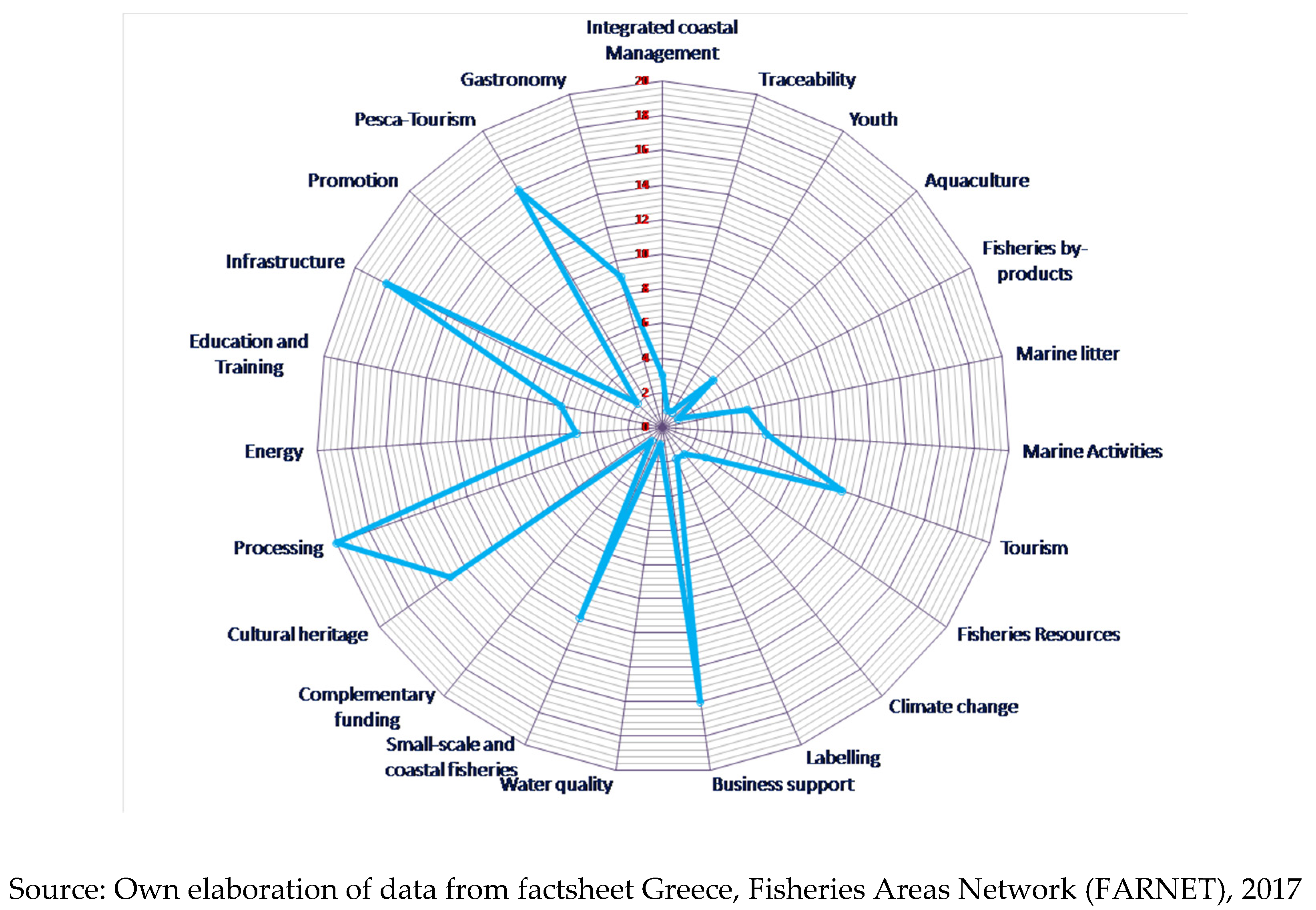
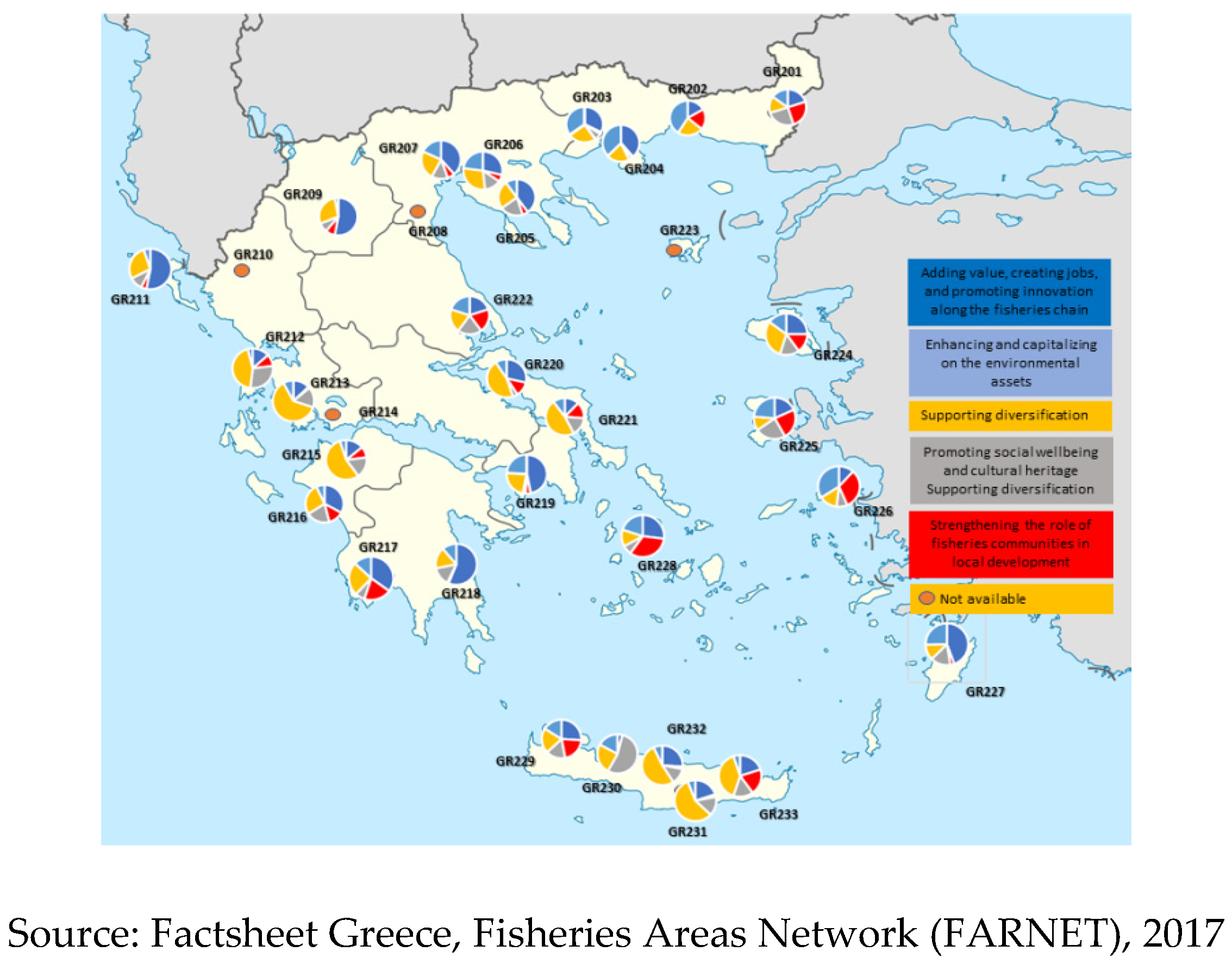
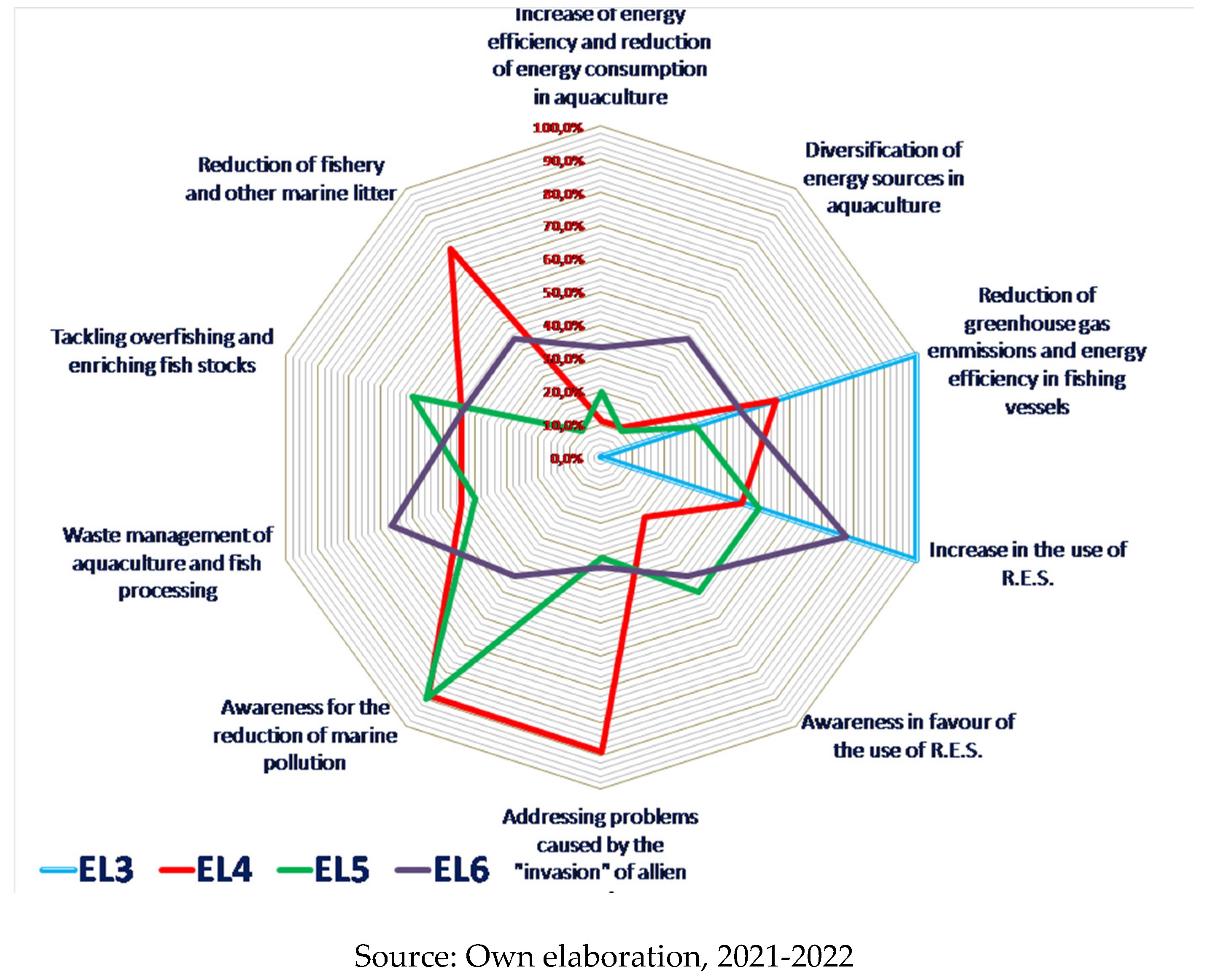
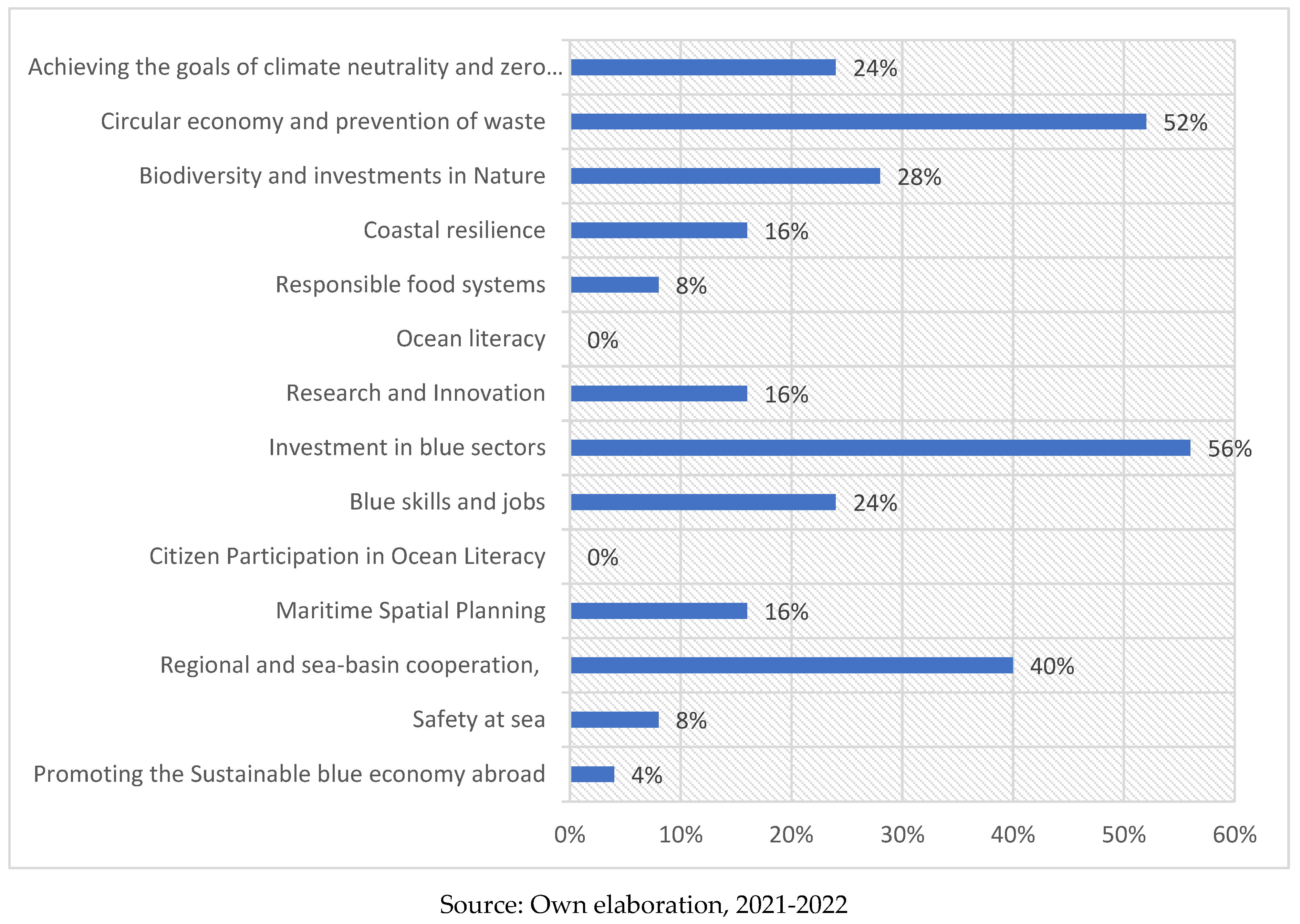
| Objectives of EGD | Agenda for blue economy (May 2021) |
|---|---|
| Climate neutrality and zero pollution | Development of offshore renewable energy, decarbonization of maritime transport and greening ports. |
| Switch to a circular economy and reduction of pollution | Establishment of renewed standards for fishing gear design, ship recycling, decommissioning of offshore platforms, actions to reduce plastics and microplastics pollution. |
| Preservation biodiversity and investment in nature | Protection of the 30% of the EU’s area to reverse biodiversity loss, increase fish stocks, contribute to climate mitigation and resilience, minimize environmental impacts on marine habitats and generate significant financial and social benefits. |
| Support of climate adaptation and coastal resilience | Development of green infrastructure in coastal areas that will protect coastlines from the risk of erosion and flooding, preserve biodiversity and landscapes and benefit tourism and coastal economy. |
| Sustainability of food production | New marketing standards for sea food, use of algae and seagrass, strong fisheries control, R&D in cell-based seafood and sustainable aquaculture. |
| Management improvement of space at sea | Establishment of a Blue Forum for users of the sea coordinating a dialogue between stakeholders and stimulating a cooperative exchange for the sustainable use of marine environment and the implementation of the EU Directive on Maritime Spatial Planning (MSPD). |
Disclaimer/Publisher’s Note: The statements, opinions and data contained in all publications are solely those of the individual author(s) and contributor(s) and not of MDPI and/or the editor(s). MDPI and/or the editor(s) disclaim responsibility for any injury to people or property resulting from any ideas, methods, instructions or products referred to in the content. |
© 2023 by the authors. Licensee MDPI, Basel, Switzerland. This article is an open access article distributed under the terms and conditions of the Creative Commons Attribution (CC BY) license (http://creativecommons.org/licenses/by/4.0/).





